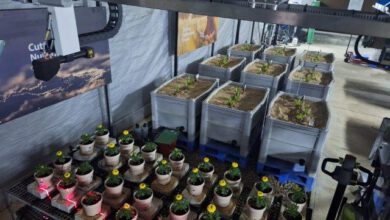Champignons that never blacken, increased-yield rice, melons and citruses
A National Genome Editing Center will be set up in Israel

The Ministry of Agriculture will invest approximately 60 million NIS in setting up the new National Center, which will advance the development of innovative, improved-feature food products
Ever since the human race came into being and with it the need to supply food for its sustenance, man has selectively cultivated the food he grows in the hope of identifying strains which would better suit his changing needs. In agriculture, the genomic editing technology promises to revolutionize the methods we used to upgrade the food we eat.
Champignons that never blacken, increased-yield rice, melons and citruses more resistant to disease, tomatoes with improved flowering capacity. These are all just a fraction of the global research industry within the food sector, which has been burgeoning lately and which has been successful, within a relatively short period of time, in developing agricultural products with new properties.
As part of this global trend, the Ministry of Agriculture will, for the first time, be investing 60 million NIS in establishing the National Genome Editing Center. In the new center that will be established, research will be conducted which will lead to the development of new and innovative agricultural products in the plant and livestock fields. Over twenty scientists from Israel’s four leading academic institutions will be participating: the Volcani Institute, the Tel Aviv University, the Hebrew University and the Weizmann Institute.
In recent years, the food industry has faced tremendous challenges. These include: the need to feed an ever-growing population, troubles and shortcomings in the field of food security, the need to develop resistance to diseases and pests in order to be able to reduce reliance on spraying, consumer demand for healthier nutrition and the need to preserve the environment and be environmentally responsible.
One of the tools for coping with these problems is through genomic editing, thereby producing future food products with improved properties. Already today, “genomic editing” technologies are transforming the global food industry. They constitute one of the most innovative, fastest-growing technologies enjoying friendly attitudes from the world regulatory perspective. “Genomic editing” enables new capabilities previously impossible to achieve using older technologies.
Dr. Avi Perl, Chief Scientist at the Ministry of Agriculture: “Through this new Center, Israel will continue to retain its relative advantage in the field. It will also retain its position at the forefront of research technology.
The new Center will enable development of innovative agricultural tools and technologies currently lacking in the market, a fact which has been a hinderance in the use of this field. Besides the relative advantage, this will enable substantial improvement, which will make life easier for the consumer and the farmer alike, so that Israeli research will be able to work in full cooperation with all of the players in the Israeli and international farming industry to continue to develop the field to be able to meet all the challenges we anticipate in the coming years and in the more distant future.
The Center, with all of the innovative scientific infrastructures that will be set up within it, will make a significant contribution toward improving the scientific infrastructure at the disposal of researchers in the country. It will lead to the creation of a high-quality pool of new scientists in the field, who will be working in close cooperation with local and global industry in the farming and food sectors”.




